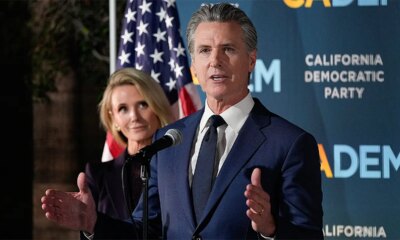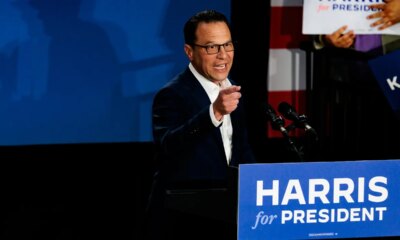Arizona
Arizona Democrats bar press from convention events, defying norms

CHICAGO – Arizona Sen. Mark Kelly, fresh from Kamala Harris’ vice presidential short list, kicked off the morning for Wisconsin Democrats on Tuesday with a plea to avoid complacency and get voters to the polls.
“We cannot allow Donald Trump to get within a mile of the White House again,” the former astronaut told the breakfast crowd on Day 2 of the Democratic National Convention. “This is not rocket science. It isn’t. If it was, I could help you with that.”
Kelly’s remarks were aired on C-Span and open to journalists, as state delegation breakfasts typically are at the parties’ conventions every four years.
But in 2024, the Arizona Democrats and Republicans both denied access to journalists, puzzling some delegates who said there was nothing sensitive – just the usual speechifying and daily pep rally.
“It’s a good way for the Democrats from Arizona to see who else is there and meet each other because in a venue like this, people are from all over the country,” said Ellen Ferreira, one of the Arizona Democratic Party’s 91 delegates in Chicago and president of the Sedona-area Democrats of the Red Rocks. “Nothing high level or secretive went on. I don’t see any reason why the press wasn’t (there).”
Other delegates also had no explanation for excluding news media from the Arizona delegation’s breakfast meetings.
GET THE MORNING HEADLINES DELIVERED TO YOUR INBOX
The state Democratic Party’s spokeswoman, Patricia Socarras, said by email that while delegates would be available for interviews, the breakfast was “not open to the press.” She provided no explanation, or speaker lists.
Arizona Republicans similarly refused to let in reporters at the GOP convention in Milwaukee in June.
For both Arizona parties, barring news media from delegation breakfasts is a departure from previous national conventions – and from the tradition of openness continued by other state delegations this year. These morning gatherings are a major focus on the delegates’ day, an opportunity to hear from state and national party luminaries and size up future contenders.
New York delegates, for instance, heard Monday morning from Empire State VIPs – Gov. Kathy Hochul, Senate Majority Leader Chuck Schumer and House Minority Leader Hakeem Jeffries – and from Minnesota Sen. Amy Klobuchar, according to the American Prospect and other news reports.
The Georgia delegation heard from Sen. Raphael Warnock.
“Donald Trump tried to steal Georgia’s votes,” he said, according to Politico, referring to a call pressuring the state’s top elections official to somehow find enough votes to tip the 2020 election his way. “Kamala Harris is trying everything she can to earn our votes.”
Wisconsin delegates heard not only from Kelly but also from Minnesota Gov. Tim Walz – Harris’ choice for running mate.
Walz also made a surprise appearance at the Pennsylvania breakfast, according to MinnPost, though Minnesotans had to make do on Monday with Klobuchar and the state’s lieutenant governor.
The Illinois delegation heard from Walz’s wife, Gwen Walz, according to Axios, plus their own governor, JB Pritzker, and New Jersey Sen. Cory Booker.
That’s a sampling of the breakfast events open to the press in Chicago this week.
On Wednesday, Gov. Katie Hobbs headlined the Arizona breakfast, along with Booker and Michigan Gov. Gretchen Whitmer.
On Tuesday, Maryland Gov. Wes Moore, a rising Democratic star, spoke to the Arizona delegation along with Education Secretary Miguel Cardona and Interior Secretary Deb Haaland, the first Native American to serve as a cabinet secretary.
That’s all according to delegates in the room who provided that information to Cronkite News; the state party itself has declined even to identify speakers.
At the Arizona breakfast on Monday, delegates heard from Secretary of State Adrian Fontes, Tucson Mayor Regina Romero and Phoenix Mayor Kate Gallego – and they were “amazing,” according to a social media post by delegate Stephen Roe Lewis, governor of the Gila River Indian Community.
“It was nice, kind of building up the energy because everyone is tired and it was early,” said Llama Habern, a first-time delegate and co-founder of the Rural Organizing Initiative. “It was fun that we all have the Arizona shirts.”
Habern said the state party chair, Yolanda Bejarano, also addressed delegates, that Fontes “was really good at getting a room going,” and that delegates rallied around the goal of “taking back the Senate.”
Asked later why the event wasn’t open to reporters, Gallego said she was “happy to share anything I said.”
“We have had reporters around all the time,” Gallego said. “When Arizona landed, most of our delegation did interviews at the baggage claim. So I feel like it’s been great representation for the Arizona media.”
Tom Morrissey, a former chair of the Arizona Republicans, said he allowed reporters into the delegate breakfasts at the 2012 convention, but times have changed.
“I don’t recall my keeping the press out because I believe in open discussion, but the temperature of the country and the landscape has shifted substantially,” he said by phone. “It’s a judgment call. I guess if I were chairman today, there might be times or circumstances where I wouldn’t allow somebody in that I thought might compromise the integrity of the meeting.”
Kansas Democrats closed their Monday breakfast to the media but said that was an isolated decision.
“Some folks do not want press there for various reasons, whether it’s to protect their identity, job security, that kind of stuff, but they might have really compelling stories or history that is motivating to our delegation, so we still want them there,” said Matthew Lang, communications director for Kansas Democrats. “Otherwise, we open up the space to the press.”
In 2016, Arizona Democrat and Republican delegation breakfasts provided insights into how the conventions intersected with Arizona issues and campaigns, as documented by Arizona news outlets.
Black Lives Matter discussions stood out in the Democrats’ meeting that year, soon after Dalvin Hollins, a Black robbery suspect in Tempe, was shot and killed by police.
That year, Arizona GOP leaders called for party unity after the divisive primaries that led to Trump’s nomination. They discussed outreach to independent voters and previewed campaign strategies.

Arizona
Warmer temps increase rattlesnake risks: Arizona Game and Fish

PHOENIX – Officials with the Arizona Game and Fish Department said unseasonably warm temperatures in the state will increase risks for rattlesnake encounters.
What they’re saying:
In a statement released on Feb. 27, the agency said while rattlesnakes are most active in desert areas from March through October, they “may appear earlier in the year as warming temperatures bring them out of winter hibernation.”
“During the spring, it’s common for rattlesnakes to be out during daylight hours,” read a portion of the statement. “As the days become increasingly hot, rattlesnakes tend to move around more at night.”
What you can do:
Officials said there are things people can do to keep themselves safe, including:
- Step back and let a rattlesnake move away if you see one on a trail
- Be mindful of where you place your feet and hands, because rattlesnakes can easily blend in with their surroundings
- Carry a flashlight at night, especially on warmer nights when rattlesnakes can be most active
- Clean up yard debris and reduce standing water near homes, in order to avoid attracting rattlesnakes
- Stay on marked trails, as rattlesnakes encounters are more likely to occur when a person leaves a marked trail
Game and Fish officials said people should do the following if someone was bitten by a rattlesnake:
- Remain calm
- Reassure the victim
- Call 911 and seek medical attention without delay
- Remove all jewelry and watches from the affected area
- Immobilize the extremity, and keep it below the heart
- Decrease total body activity, as feasible
The Source: Information for this article was gathered from a statement released by the Arizona Department of Game and Fish.
Arizona
Idaho 78-58 Northern Arizona (Feb 26, 2026) Game Recap – ESPN

MOSCOW, Idaho — — Jackson Rasmussen had 19 points in Idaho’s 78-58 win over Northern Arizona on Thursday.
Rasmussen also had seven rebounds for the Vandals (16-13, 8-8 Big Sky Conference). Isaiah Brickner scored 15 points while shooting 6 of 11 from the field and 2 for 4 from the line. Jack Payne shot 4 for 5 from beyond the arc to finish with 12 points.
Diego Campisano finished with 11 points for the Lumberjacks (10-19, 4-12). Chris Komin added 11 points for Northern Arizona. Karl Markus Poom also had 10 points.
—-
The Associated Press created this story using technology provided by Data Skrive and data from Sportradar.
Arizona
Former Arizona town employee sentenced in COVID-19 relief, embezzlement case

PARKER, AZ (AZFamily) — A former employee of a western Arizona town has learned her fate after being convicted in connection with COVID-19 relief fraud and embezzlement.
Arizona Attorney General Kris Mayes said Thursday that Jennifer Elizabeth Alcaida, 50, a former office specialist for the Town of Parker, was sentenced by a Mohave County Superior Court judge to three and a half years in prison.
According to court records, between July and Sept. 2021, Alcaida took a total of $173,295.54 by writing unauthorized checks from town accounts, keeping cash she was required to deposit, and making personal purchases on a town-issued credit card.
Records also show she received more than $20,000 from the federal Paycheck Protection Program through the U.S. Small Business Administration after claiming the funds were needed to cover payroll for a personal business that did not exist.
Alcaida pleaded guilty Jan. 6 to felony charges of fraudulent schemes and theft. After her prison term, she will serve seven years of probation and has been ordered to pay $194,128.54 in restitution.
“This case is a clear example of someone who abused the public’s trust for personal gain,” Mayes said in a written statement. “Arizonans deserve to know that those who steal from their communities will be held accountable, and this sentence reflects exactly that.”
See a spelling or grammatical error in our story? Please click here to report it.
Do you have a photo or video of a breaking news story? Send it to us here with a brief description.
Copyright 2026 KTVK/KPHO. All rights reserved.
-

 World2 days ago
World2 days agoExclusive: DeepSeek withholds latest AI model from US chipmakers including Nvidia, sources say
-

 Massachusetts2 days ago
Massachusetts2 days agoMother and daughter injured in Taunton house explosion
-

 Montana1 week ago
Montana1 week ago2026 MHSA Montana Wrestling State Championship Brackets And Results – FloWrestling
-

 Louisiana5 days ago
Louisiana5 days agoWildfire near Gum Swamp Road in Livingston Parish now under control; more than 200 acres burned
-

 Oklahoma1 week ago
Oklahoma1 week agoWildfires rage in Oklahoma as thousands urged to evacuate a small city
-

 Denver, CO2 days ago
Denver, CO2 days ago10 acres charred, 5 injured in Thornton grass fire, evacuation orders lifted
-

 Technology7 days ago
Technology7 days agoYouTube TV billing scam emails are hitting inboxes
-

 Technology7 days ago
Technology7 days agoStellantis is in a crisis of its own making






















